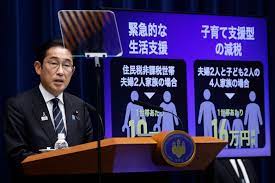A stimulus program worth over 17 trillion yen ($113 billion) was unveiled by Japanese Prime Minister Fumio Kishida on Thursday. The proposal, which includes tax rebates and incentives for low-income people, has drawn criticism from some commentators who see it as populist spending that will increase Japan’s national debt.
According to Kishida, overcoming deflation and putting the economy on a growth path is his top priority. In an explanation of the deal his cabinet had earlier in the day, he told a news conference that tax collections will only rise when the economy expands and results in fiscal health.
In order to pay for the expenditures, the government will assemble a supplemental budget for the current fiscal year totaling 13.1 trillion yen ($87 billion).
The economy of Japan is about to emerge from deflation. If we pass up this opportunity, it will be harder to do so,” he stated. “My goal is to increase disposable income, stimulate growth, and establish a positive feedback loop.”
Kishida noted that one major difficulty is that pay raises have not yet kept up with inflation.
In addition to payouts of 70,000 yen ($465) to low-income households and a temporary tax decrease of 40,000 yen ($266) per person starting in June of next year, the package also includes subsidies for utility and gas bills.
According to a government assessment, the proposal as a whole would increase Japan’s GDP by roughly 1.2% on average.
His government set aside a nearly 30-trillion-yen ($200 billion) supplemental budget last year to pay for an earlier economic package intended to combat inflation.
The Nomura Research Institute’s executive economist, Takahide Kiuchi, predicted that the package’s impact on the economy will be restricted because savings are typically the recipients of short-term tax breaks and rewards. According to him, such actions won’t alter consumer behavior and won’t have much of an effect on the economy in the medium to long run.
According to Kiuchi, the most recent actions appear to be “an attempt to please everyone.” He noted that although the government had previously called for “normalizing” the higher spending during the pandemic that exacerbated Japan’s government debt, the economic package appeared to be a swift reversal of that position.
Since it takes time to enact laws, opposition MPs have questioned the wisdom of using tax cuts as a means of combating inflation.
Kishida was accused by Akira Nagatsuma, the chairperson of policy research for the main opposition Constitutional Democratic Party of Japan of abruptly switching to tax cuts to hide his apparent support for a tax increase to finance rising defense spending over the next five years, in accordance with a new security strategy that was approved in December.

















